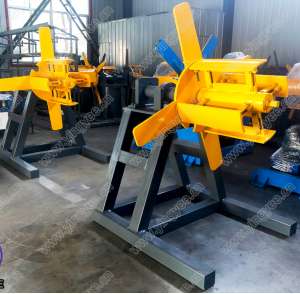
C-Shaped Steel Roll Forming Machine Revolutionizing Steel Fabrication
In the modern era of construction and manufacturing, efficiency and precision are paramount. One of the technologies that plays a critical role in this landscape is the C-shaped steel roll forming machine. This machine is designed to fabricate C-shaped steel profiles, which are widely used in various industries, including construction, automotive, and manufacturing. In this article, we will explore the working principles, advantages, applications, and maintenance of C-shaped steel roll forming machines.
Working Principles
The C-shaped steel roll forming machine operates on a continuous production line basis. The process begins with feeding raw steel coils into the machine. These coils are usually made of high-strength steel sheets that are durable and versatile. As the steel coils enter the machine, they are unwound and continuously fed through a series of rollers. These rollers progressively shape the flat steel into a C-profile through a series of bending and forming stations.
Each station is meticulously engineered to perform specific tasks, such as cutting, punching, and forming, until the desired C-section profile is achieved. After the final profile is produced, the material can be cut to predetermined lengths, providing a finished product ready for use. The whole process is controlled by a computerized system, ensuring precision and consistency with every piece produced.
Advantages of C-Shaped Steel Roll Forming Machines
The C-shaped steel roll forming machine offers numerous advantages, making it a vital asset for industries engaged in steel fabrication. Here are some key benefits
1. High Efficiency The continuous production process allows for the rapid manufacturing of C-steel profiles, significantly reducing lead times compared to traditional fabrication methods.
2. Cost-Effectiveness By optimizing raw material usage and minimizing waste, companies can realize significant cost savings. Additionally, the scalability of the machines enables businesses to handle both large and small production runs efficiently.
3. Precision and Consistency With advanced technology, these machines produce profiles that meet stringent dimensional tolerances. This consistency ensures that components fit perfectly during assembly, reducing the likelihood of errors and reworks.

5. Durability The C-profiles produced are robust and strong, making them suitable for demanding applications in construction and heavy-duty use.
Applications
C-shaped steel sections created by roll forming machines have a wide range of applications across various sectors
- Construction C-sections are commonly used as structural support in buildings, warehouses, and industrial facilities. Their strength-to-weight ratio and ease of assembly make them a preferred choice for many construction projects.
- Automotive Industry In automotive manufacturing, C-shaped profiles are used to produce frame components and bracketing systems, contributing to vehicle structural integrity and safety.
- Manufacturing Equipment Many manufacturers rely on C-sections for machine frames, supporting structures, and other components that require strength and stability.
Maintenance and Care
To ensure the longevity and optimal performance of a C-shaped steel roll forming machine, regular maintenance is crucial. Operators should perform routine inspections to check for wear and tear on rollers and other moving parts. Proper lubrication and alignment are essential to prevent malfunctions and guarantee precision in production. Moreover, ensuring that the machine is clean and free from rust and debris will enhance its operational lifespan.
Conclusion
The C-shaped steel roll forming machine has become an indispensable tool in the world of steel fabrication. Its efficiency, precision, and versatility make it an attractive option for a variety of industries. As technology continues to advance, these machines will likely evolve, offering even more capabilities and innovations that will shape the future of construction and manufacturing. Investing in a C-shaped steel roll forming machine will not only improve production processes but also contribute to the overall quality and durability of fabricated steel products.